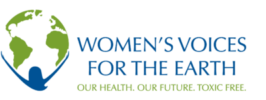New Data Reveals One-Third of All Fragrance Chemicals Linked to Human, Environmental Harm
FOR IMMEDIATE RELEASE — New data compiled by national environmental health non-profit, Women’s Voices for the Earth (WVE), reveals that a third of all fragrance chemicals currently in use have been flagged as potentially toxic by scientists around the world.[1]
This data fully compliments a landmark report released today by Breast Cancer Prevention Partners (BCPP) — Right to Know: Exposing Toxic Fragrance Chemicals in Beauty, Personal Care and Cleaning Products — which tested household products and clearly revealed the presence of harmful fragrance chemicals linked to cancer, hormone disruption, reproductive harm, and respiratory toxicity that do not appear on the label.
Fragrances are found in thousands of consumer products, yet there is little regulatory oversight of the safety of those ingredients. The current system for fragrance safety is run almost entirely by the industry’s own International Fragrance Association (IFRA) and their research arm, the Research Institute for Fragrance Materials (RIFM).
“Manufacturers of scented products largely rely on the fragrance industry to supply them with safe fragrances,” said Alexandra Scranton, WVE’s Director of Science and Research. “But our research shows that the fragrance industry’s safety program is letting manufacturers down. We discovered that one-third of currently available fragrance chemicals are either known to be toxic or considered potentially toxic by scientists around the world. BCPP’s product testing confirms that not only are these toxic fragrance chemicals available to fragrance-creators, they are commonly being used in the products we use everyday.”
WVE’s report includes a deep-dive analysis of the IFRA Transparency List, a list of nearly 4,000 chemicals known to be currently used in fragrances around the world.[2] WVE compared this list to numerous lists of chemicals of concern, including most recently, examining the GreenScreen® for Safer Chemicals List Translator scores for each fragrance chemical. About one-third of all fragrance chemicals received a List Translator score that indicates a chemical of concern. (GreenScreen® is an internationally recognized tool for comparing and assessing the hazards of chemicals in order to identify those of high concern and evaluate safer alternatives.)
BCPP’s report disclosed the results of chemical testing of 140 popular U.S. personal care and cleaning products. The testing revealed hundreds of toxic chemicals in these products, the majority of which were associated with the fragrance in the product.
“Our report found that three out of four of the toxic chemicals in the beauty and personal care products we tested were fragrance chemicals,” said Connie Engel, Ph.D., BCPP Senior Manager of Science Translation. “And most of these toxic chemicals were not found on the product label.”
No federal law requires the disclosure of fragrance ingredients to consumers, manufacturers or even regulatory agencies. This labeling loophole allows dozens – sometimes even hundreds – of chemicals to hide under the word “fragrance” on the product labels.
For example, BCPP testing of the product Summer’s Eve Freshening Spray revealed several toxic chemicals used to make up the product’s scent, including DEHP — a widely known phthalate linked to reproductive and developmental harm, which is banned from use in cosmetics sold in Europe. DEHP is not listed on the label.
“When we see chemicals like DEHP in Summer’s Eve products, it confirms our worst fears, that the fragrance industry does not screen carefully for safety and routinely produces fragrances containing harmful chemicals. And the fact companies are allowed to keep such potentially harmful ingredients a secret is absolutely unacceptable,” said Scranton. “Fragrance houses and manufacturers are putting public health at risk.”
“These new reports clearly show why more transparency and better regulation of beauty and personal care products, and the fragrances they contain, is so urgently needed,” said Jamie McConnell, WVE’s Director of Programs and Policy. “We support the Safe Cosmetics and Personal Care Products Act of 2018, introduced today U.S. Rep. Jan Schakowsky, which calls for full fragrance ingredient disclosure and stricter regulation of the fragrance and personal care industries.”
WVE’s newly published data on fragrance chemicals is an extension of WVE’s 2015 report, Unpacking the Fragrance Industry: Policy Failures, the Trade Secret Myth and Public Health, an investigative report calling attention to the failures of the industry’s self-regulating safety policy.
###
 |
 |
 |
ABOUT
Women’s Voices for the Earth
Since 2007, Women’s Voices for the Earth has run a sustained campaign to promote full ingredient disclosure. Their fragrance campaign work includes reports Secret Scents and What’s That Smell? and, most recently, Unpacking the Fragrance Industry: Policy Failures, the Trade Secret Myth and Public Health, an investigative report calling attention to the failures of the industry’s self-regulating safety policy.
Founded in 1995, Women’s Voices for the Earth amplifies women’s voices to eliminate the toxic chemicals that harm our health and communities. With thousands of members across the United States, WVE changes corporate practices, holds government accountable, and works to ensure a toxic-free future for all. www.womensvoices.org.
Breast Cancer Prevention Partners
Breast Cancer Prevention Partners (BCPP) is the leading national science-based policy and advocacy organization working to prevent breast cancer by eliminating our exposure to toxic chemicals and radiation. In 26 years, BCPP has achieved much, including passing critical state and federal legislation, issuing over 30 major scientific reports, and influencing multi-national corporations such as Unilever, Procter & Gamble and Johnson & Johnson to adopt safer chemical policies. www.bcpp.org
The Campaign for Safe Cosmetics, a project of BCPP, is a broad-based national coalition of nonprofit environmental health and justice, workers’ rights and women’s health organizations and safe cosmetic companies. The Campaign’s mission is to protect the health of consumers, workers and the environment by securing the corporate, regulatory and legislative reforms necessary to eliminate dangerous chemicals linked to cancer, reproductive harm and other adverse health impacts from cosmetics and personal care products.
Media Contacts
Beth Conway – bethc@womensvoices.org 406-543-37447 (Women’s Voices for the Earth)
Erika Wilhelm – media@bcpp.org 415-321-2920 (Breast Cancer Prevention Partners)
—————————-
[2] https://womensvoices.org/wp-content/uploads/2018/09/Fragrance_Report_Updates_2018.pdf


